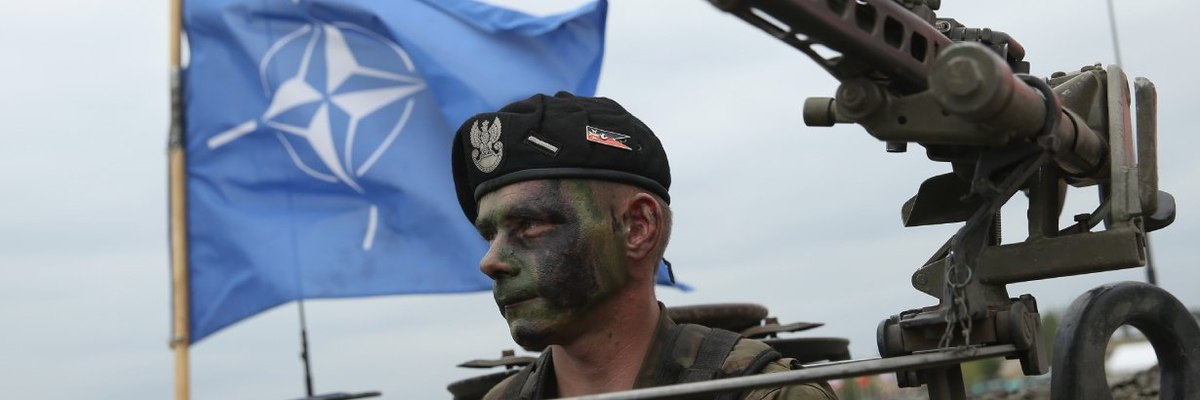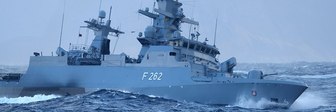If everything goes according to plan it is only a matter of weeks before Nato becomes a more powerful strategic and defensive alliance than it has been at any time since it was created 73 years ago. Two more countries are on the cusp of joining the alliance: Finland and Sweden. They will make a significant contribution to the might of Nato forces but it’s the timing that matters. Both countries have maintained their neutrality since World War II. The fact that they are now about to align themselves militarily with Nato when relations between the west and Russia are at their most dangerous for decades sends a powerful signal to Moscow. Some see it as dangerously provocative in the face of chilling threats from Putin and his henchmen. Others believe it not only strengthens the western alliance in the face of those threats but could transform the geo-political map of Europe. Where do you stand?
William Hague, Britain’s former foreign secretary and leader of the Conservative Party, believes the accession of Finland and Sweden should be only the beginning of steps towards a more powerful Nato. The two countries will strengthen both Nato’s air power and reserves of trained soldiers. It will also double the land border between Nato and Russia and significantly enhance the defence of the Baltic states. In a column in The Times Lord Hague concedes that the prospect of such an expansion of Nato will be seen by Vladimir Putin as a serious provocation. It will, he says, ‘bring forth the strongest version of his threats, countermeasures and bullying. Nuclear missiles will be redeployed, border crossings closed, battalions brought to the frontier. Putin will warn that he is ready to talk peace with the Ukrainian president Volodymyr Zelensky but only if this "provocation" is halted. Bluster and blackmail will go into full swing.’
Instead of bending to the threats from Moscow, says Hague, the best answer to this will be for Nato leaders to give Finland and Sweden instant membership. He writes: ‘Months would normally be needed to discuss details and for 30 parliaments to ratify the extension of the Washington Treaty, even in the accelerated process now being discussed. But for nations in close proximity to Russia to join Nato at a time of war in Europe is unprecedented. This calls for the political will and legal ingenuity to extend the full protection of Article 5 (which says that an attack on one member of Nato is an attack on all) to Finland and Sweden literally overnight, with a clear declaration signed in all allied capitals followed by a ratification process in record time...Nato leaders could then arrive at their summit in Madrid at the end of next month with the expansion of the alliance as an established fact, whatever Putin's threats.’
That expansion should mean more than Nato members increasing spending on defence from 2% to 2.5%. But, says Hague, it will be vital to have a common understanding of what that should be spent on rather than make the Russian mistake of buying a great deal of expensive kit without being able to use it well. A substantial slice of higher spending needs to go into the necessities of large-scale and lengthy warfare: endless training for the ‘combined arms’ manoeuvres at which the Russians have struggled; much bigger stocks of ammunition, missiles and spare parts; and the ability to mobilise a far larger, trained reserve within our own populations. Britain, for instance, needs many more reservists and cadets, and our society would benefit from the training of them.
But Hague goes further. He’s not alone in believing that their invasion of Ukraine has revealed the weakness of Russia’s conventional forces. A good thing, on the face of it, but the danger is that it has increased the risk of Moscow resorting to the use of chemical or even tactical nuclear weapons.
That, says Hague, is a ‘missing link’ in our common defence: ‘With Putin's ground forces exhausted or preoccupied with Ukraine he will make more use of sub-sea and airborne threats. Britain and our allies will need better ballistic missile defences, more antisubmarine warfare frigates, new stealth aircraft and the ability to protect undersea cables. Nato also needs to contain any other Russian adventurism in Europe. It should help Georgia to improve its defences and deploy forces to Bosnia to deter attempts to destabilise the western Balkans.’
Liz Truss, who inherited Hague’s old job as foreign secretary, seems to share his views – at least a far as Putin’s ambition are concerned. She has described Putin as a ‘rogue operator’ who is lacking rationality and has ‘no interest in international norms’. As a result, she said: ‘We will keep going further and faster to push Russia out of the whole of Ukraine.’
Some believe all this is dangerous talk: dangerous and deluded. Sir Simon Jenkins has written in The Guardian that she is ‘clearly revelling in her imagined proxy war on the Russian bear and no one in Whitehall appears able to restrain her’. The use of the word ‘we’ publicly identifies Britain’s interests with Kyiv’s. What worries Jenkins is that Truss’s calls for ever more economic and military aid to be sent to Ukraine ‘teeters on the brink of overt engagement with Russia.’ Nowhere, he says, does she mention the risks involved in how Putin might react. Nor does she explore the possibility of reaching peace through compromise. He calls it ‘tabloid diplomacy’.
Jenkins is one of many who have warned over the years that there are grave risks in Nato expanding to Russia’s border but in this crisis, he says, it has operated with impressive self-discipline: ‘ It has laid down the parameters of its aid to Ukraine and stuck to them. Two decades of highly provocative Nato encirclement of Russia halted at Georgia and Ukraine in the knowledge that going further would permanently inflame Moscow. Nato stayed aloof from Russia’s Crimea and Donbas occupations. Putin’s assault on Kyiv this spring was of a different order, but again Nato calibrated its response. It was able to present a united front to Russia while not inviting Moscow to retaliate beyond Ukraine’s borders.’
He believes that Putin will settle ‘as and when he feels he has reached his military limit’. That’s why it makes sense to send weapons to Kyiv. But he warns against Nato being drawn into the fight. Apart from anything else, a war with Nato would hugely reinforce Putin’s domestic popularity.
But what if Putin has no ‘military limit’? What if the Ukrainian resistance proves impossible to overcome? In the past few days the world has listened to Putin himself and his most senior propagandists making the most terrifying threats. What if they are more than merely threats and Putin does indeed take the war beyond Ukraine’s borders and authorises military action against Nato itself? What would we in the west do in those terrifying circumstances? Obviously we would come under huge pressure from our allies in eastern Europe to retaliate and if/when we did, we would be at war with Russia. The consequences of that are unimaginable, but imagine them we must. And they would have to include – as Putin has threatened - Moscow deploying a so-called ‘tactical’ nuclear weapon.
The historian Dominic Sandbrook has reminded us in an essay for the Mail that a former US defence secretary, General James Mattis, warned four years ago: 'I do not think there is any such thing as a tactical nuclear weapon. Any nuclear weapon used any time is a strategic game-changer.' He went on to write that ever since the first successful test of an atomic weapon in the desert of New Mexico in 1945 ‘mankind has been enormously, and perhaps undeservedly, lucky.
Sandbrook added this chilling thought: ‘As a species, we have been arrogant and reckless enough to build weapons that can destroy us many times over. We have survived several near misses, and every time we have congratulated ourselves on our good sense. And we have forgotten that it takes
only one vicious, bitter, unpredictable man to set the world on a path to utter destruction.’ He completed his essay by quoting the words of J. Robert Oppenheimer, the director of the Manhattan Project as he watched the fireball became a great mushroom cloud rising above the desert: ‘Now I am become Death, the destroyer of worlds.'
On the day that essay was published the defence ministry in Moscow confirmed that military exercises had been conducted on territory sandwiched between Poland and Lithuania. The exercises had included nuclear-capable missiles, though the troops involved in rehearsals for their use did not actually launch any of them. There were instead so-called electronic launches’ of Iskander ballistic missiles. Earlier in the week Kremlin propagandists had been using terrifying rhetoric. One of them warned that Great Britain could be wiped off the map with a single rocket armed with the Kremlin’s latest nuclear warheads. Putin himself warned that it could be used in a ‘lightning strike’ against anyone who ‘interfered’ with him. He reminded the world that Russia has the largest nuclear arsenal totalling 4500 warheads.
Where do you stand in what may become the single most deadly crisis facing humanity? Do you accept that Nato must expand and spend more on defence? Or do you think the risk of provoking Putin is too great? Do you believe that Putin is, setting aside his rhetoric, just as terrified of provoking a nuclear confrontation as we are and will, in the end, settle for an agreement over Ukraine even if it causes him some loss of face? Or do you fear that he is so deranged he is capable of becoming ‘Death, the destroyer of worlds’?
Let us know what you think.








